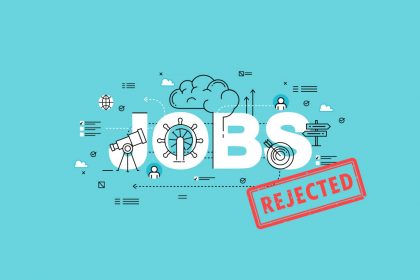What to do if you’re asked a personal question in a job interview
Wondering how to respond if you’re asked an inappropriate question by a recruiter? Find out what to do if you’re asked a personal question in a job interview.
A job interview is THE most important step in securing a new job. At this stage, the employer decides whether they will hire you for the role, and even make decisions on what salary they will offer you.
The average job interview lasts 40 minutes, and during this time, it is important to show off all your very best and most employable attributes.
To ensure this happens it’s wise to prepare in advance. So research everything from the company’s mission statement and latest news, to how long it will take you to travel to the interview and what they’re looking for in the vacant role.
And of course there’s one thing you absolutely need to be ready for, and that is interview questions. Try to think about what they might ask you, so you have answers ready, and aren’t left floundering for something to say.
It’s also a good idea to prepare your own questions to ask. After all, a job interview is also your chance to find out more about the role and the company culture, and decide if you even want to accept the position if you’re offered it.
But as much as you can try to be ready to answer every possible question you might be asked, there’s always the chance that you will be faced with a surprise, even personal or inappropriate, question.
Recruiters want to find out more about your skills, intelligence, work experience, as well as your habits, psychological resilience and character. Sometimes these questions can get personal, and some employers may even fail to adhere to the basic principles of ethics and legislation that protect a candidate from discrimination.
There are many techniques to keep you stay calm during an interview. But it can be hard to keep your cool when faced with what feels like a personal or inappropriate question. Keep reading to learn if it is legal to ask personal questions during an interview, and how to respond to them.
Three types of tricky interview questions you might be asked
Job hunters are prepared to answer questions related to their education, career goals, professional achievements, reasons for dismissal, desired salary, etc. But personal questions can catch us by surprise.
There are several types of off-topic questions that you might be faced with in a job interview. Here are three of them.
1) Sudden, unexpected questions
There is nothing illegal about unexpected questions, but they can take you aback. For example, you might be asked what animal you are like, what object you associate yourself with, or what fruit the company resembles.
2) Behavioural evaluation questions
With these questions you will need to argue your opinion, or describe your vision and attitude to something.
3) Personal tricky questions
While the first two types of questions might be tricky to answer, these questions are more inappropriate and could leave you wondering how or even if you should reply at all.
These questions usually relate to religion, politics, racist attitudes, sexual orientation, etc. They also include uncomfortable questions for women, such as:
- Are you planning a baby?
- Why aren’t you still married?
- How does your partner make money?
And men might be asked questions like:
- What does your wife think about your career ambitions?
- How will your wife relate to long business trips and overtime at work?
- Can you manage a team of women?
From a legal standpoint, asking for personal information from an interview candidate can happen with their consent. This becomes especially important when it comes to sensitive data or, as defined by law, personal data that poses a particular risk to the rights and freedoms of a person.
This refers to the following information:
- Racial, ethnic and national origin, political, religious or ideological beliefs, membership in political parties and/or organizations, trade unions, religious or non-governmental organizations.
- Health status, sexual life, biometric, genetic data.
- Whereabouts and/or ways of moving.
- Facts of bringing to administrative or criminal responsibility.
- Committing acts of violence of any kind.
- Financial state.
If an employer requests this type of information, they must first obtain the candidate’s consent. The candidate has the right to refuse to provide the information, and this cannot be a reason for rejecting a candidate.
Federal and state regulations prohibit discriminatory employment practices when hiring, and everyone must know their rights during an employment interview.
If you believe you were asked something inappropriate, you can get a consultation from a service like Mgdesyan Law to understand where you stand legally.
Why do recruiters ask for personal information?
There is no single answer to this question. Very often, small business interviews are conducted by employees or by the startup’s owner.
They may be unaware of the law regarding this and inexperienced in interviewing and, keen to make the right decision, inadvertently pry too much into a candidate’s personal life.
When a large company is hiring new employees a full-time HR is usually responsible for choosing the most suitable candidates. At the corporate level, they may take into account other goals, like maintaining a gender balance, following the values of the company, building a team spirit, etc.
From this point of view, in the vast majority of cases, HR is driven not by mere curiosity, but by a very specific purpose – to draw a more or less accurate psychological portrait of the candidate for the position.
It doesn’t matter how strange it may sound, questions that are unrelated to the professional qualities of the applicant can become an excellent tool. Personal questions can help a company to:
- Get to know a candidate’s interests and motivation much better. They can tell a lot more about a candidate for a vacancy than a usual resume.
- Understand how close people will allow others to get, and how much personal information they’ll easily reveal to strangers. This can indicate how private (or otherwise) they may be about sensitive company issues if they were hired.
- Test a candidate’s reaction and stress. How will they handle the situation? How good at they about protecting their boundaries? And how confidently are they able to cope with a challenge, and control the situation to come out well?
For these reasons, occasionally recruiters might ask inappropriate personal questions. They can also glean a certain amount about your character from your resume, which is why it can be a good idea to use professional recruitment service like Astor Search or Ivory Research.
Do you have to answer personal questions?
The short answer is “No!” If you do choose to answer, then you should understand that your answers may be the basis for the recruiter to unlawfully refuse to hire you.
Considering that you may be rejected in any case (even if this is not legal… and let’s face it if you’re being asked an illegal question this isn’t a company who respects the law), it’s best to choose the least stressful option for yourself.
If you’re concerned that you may be asked personal questions by an employer then you can record the interview on a voice recorder or camera (with the prior consent of a recruiter).
If you are not allowed to do this and you are rejected after being asked inappropriate questions, then ask for a written explanation of the reasons for the refusal of employment. You can use this to prove the employer’s violation during the hiring process by asking illegal questions.
How to answer personal questions during an interview
Interviewing for a new job can be exhausting and nerve-wracking. According to LinkedIn data, about two-thirds (67%) of job seekers feel nervous about job interviews.
Nearly 40% of respondents say they’d rather tackle the hardest work tasks than meet with a hiring manager. Approximately 15% of candidates even feel sick before every interview. And 80% of all participants confess they are really puzzled by some of the interview questions they’re asked.
The most embarrassing moments are linked to personal information queries. But it is possible to learn how to answer these relevantly. Here are 10 suggestions for responses to personal questions in a job interview.
Question 1: Do you have or plan to have children?
Many young women have been asked this inappropriate question in an interview. The question is very intimate, and women are understandably lost in how to answer it.
It’s clear why employers ask this question: they want to know whether you might disappear off on maternity leave, or might have problems working late or in school holidays if you already have a child. It might also influence how much they’re prepared to invest in you if you do join the company.
It’s up to you how to answer this question – or even whether you want to work for someone who is prepared to ask such an outrageous question!
If you do answer it, you might want to make a case for how committed you are to your job, and the structures you have in place to ensure that your home life doesn’t interfere with work – or your ambitions.
Or you can be upfront about what you will need from the company in order to do your job well and have a healthy home life. This could be a good opportunity to raise the topic of flexible working, if it’s something you want.
Question 2: Are you married?
Are you dating anyone? Are you planning to start a family? These questions – incredibly – are often still asked by recruiters.
They may ask these questions because they’re concerned that a married person may be less mobile, and less keen to work evenings and weekends. Or they might think that married people are more reliable and consistent. Either way, it’s a highly inappropriate question to ask!
There is no obligation to answer this question. You could try turning it back on your interviewer and ask why they want to know, and what influence the answer – either way – will have on their recruitment decision. Or you could politely respond that you’d rather not answer that question.
If you have decided that this is not a company you want to work for, and are feeling brave (and humorous) you could even respond by asking, “Why, did you want to ask me out?” Though humour like this can be risky!
Question 3: How do you plan to combine work and family life?
Again, this is an opportunity to prove that having a family is no barrier to you being excellent at your job, if you choose to answer. It’s also, yet again, an opportunity to raise any questions you might have about flexible working.
Question 4: Are you prepared to work overtime?
It is entirely your decision whether you wish to work overtime or not. If you would like the job – and are happy to negotiate this detail later – you can state that.
Question 5: Tell us about clients you’ve worked with before
This question can be a test by a recruiter to see how you much information you keep confidential after you change jobs. So don’t be tempted to divulge anything that a client would not be happy to be made public. And certainly never badmouth a former client or employer.
You can simply respond that you aren’t able to disclose sensitive information and that you’re sure they understand.
Question 6: Describe yourself in a few words
This is a simple, impromptu psychological test and often puts people on the spot. So it’s good to prepare your answer for this in advance, just in case it comes up. What attributes do you want to highlight most? What examples do you have to back them up?
Most employers are looking for honest, reliable and dedicated people who can work in a team. So come up with the epithets, comparisons, and associations that highlight these features, without resorting to surface cliches like “I’m a team player” or “I have a string work ethic”.
Question 7: Have you ever been fired, and if so why?
This is a much harder question to answer. If you have, then don’t simply say “Yes” or tell them why. And absolutely do not criticise your former employer.
We’re all human, and what matters aren’t the mistakes we make (to an extent, anyway!), but what we learn from them and how we use them. So explain briefly what happened, but more importantly what you learned from it and how it’s made you better at what you do, or as a person.
Question 8: Do you keep in touch with coworkers from your last job?
Again, if you don’t have a good relationship with your former colleagues, this isn’t the place to air grievances! You can just say that you get on well with your co-workers as a whole, but aren’t currently in touch with your former colleagues.
If you have good friends or warm acquaintances then you can answer positively.
Question 9: What animal would you like to be?
As strange as this question sounds (especially asked to an adult) it’s one that does come up in interviews.
There’s no right or wrong answer here. A recruiter is just looking to see how you respond to a left-field question. It may not surprise you to know that they don’t really care what kind of animal you’d like to be, but from a psychological point of view they’re probably interested in your reasons for picking it.
So don’t just say “A cat” and when pushed “Because it sleeps a lot.” Instead come up with an interesting explanation for why this animal’s characteristics appeal to you in particular. It is fine if you need to spend a few seconds thinking about your response.
Question 10: What’s your biggest dream?
Again, a recruiter isn’t really excited to discover which famous actor you’d like to marry, or that you’d love to win the lottery. They’re asking this to get more insight into you as a person, and whether this role is aligned to the kind of goals you set for yourself.
So try to describe your goals and ambitions in a structured way. People who are steadily working to achieve their dream are characterized by higher productivity.
If you want to read more, you’ll find some useful resources about the most frequently asked questions in job interviews. This information can help you to successfully navigate unexpected interview scenarios – and potentially avoid some awkward moments!
Prepared for interview success
You can never fully plan for every question in a job interview. But careful preparation can mean that you are ready for many obvious questions – and a few unexpected surprises.
And remember: if you believe a question is illegal or inappropriate you don’t have to answer. It can even give you a good indication that this is not a company you would be computable working for, and save you potential trouble later on.
And whatever happens in your interview, remember that it’s all good experience.










